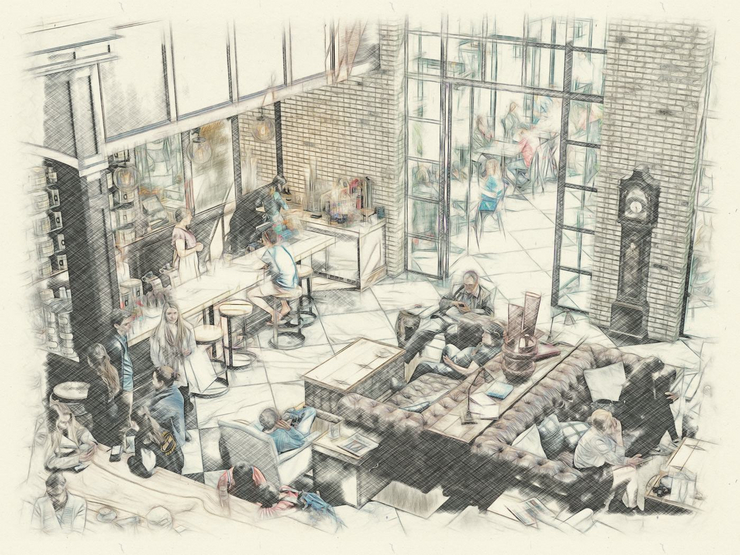Advanced Techniques for Image and Video Analysis (Sommersemester 2021)
Dozent:
Dr. Matthias Trapp
(Computergrafische Systeme)
,
Daniel-Amadeus Johannes Glöckner
(Computergrafische Systeme)
,
Max Reimann
(Computergrafische Systeme)
,
Sumit Shekhar
(Computergrafische Systeme)
,
Sebastian Pasewaldt
(Computergrafische Systeme)
Allgemeine Information
- Semesterwochenstunden: 4
- ECTS: 6
- Benotet:
Ja
- Einschreibefrist: 18.03.2021 - 09.04.2021
- Lehrform: Seminar / Projekt
- Belegungsart: Wahlpflichtmodul
- Lehrsprache: Deutsch
Studiengänge, Modulgruppen & Module
- IT-Systems Engineering
- IT-Systems Engineering
- HCGT: Human Computer Interaction & Computer Graphics Technology
- HPI-HCGT-K Konzepte und Methoden
- HCGT: Human Computer Interaction & Computer Graphics Technology
- HPI-HCGT-T Techniken und Werkzeuge
- HCGT: Human Computer Interaction & Computer Graphics Technology
- HPI-HCGT-S Spezialisierung
- ISAE: Internet, Security & Algorithm Engineering
- HPI-ISAE-T Techniken und Werkzeuge
- ISAE: Internet, Security & Algorithm Engineering
- HPI-ISAE-K Konzepte und Methoden
- ISAE: Internet, Security & Algorithm Engineering
- HPI-ISAE-S Spezialisierung
- OSIS: Operating Systems & Information Systems Technology
- HPI-OSIS-K Konzepte und Methoden
- OSIS: Operating Systems & Information Systems Technology
- HPI-OSIS-T Techniken und Werkzeuge
- OSIS: Operating Systems & Information Systems Technology
- HPI-OSIS-S Spezialisierung
- DATA: Data Analytics
- HPI-DATA-K Konzepte und Methoden
- DATA: Data Analytics
- HPI-DATA-T Techniken und Werkzeuge
- DATA: Data Analytics
- HPI-DATA-S Spezialisierung
- CODS: Complex Data Systems
- HPI-CODS-K Konzepte und Methoden
- CODS: Complex Data Systems
- HPI-CODS-T Techniken und Werkzeuge
- CODS: Complex Data Systems
- HPI-CODS-S Spezialisierung
Beschreibung
Nowadays, there is a wide range of available computer vision, augmented reality and image processing technologies and standards that enables the processing of visual media (e.g. images or videos) both for client and server application scenarios. This project seminar aims at master students who want to extend their skills in these domains regarding the analysis, planning, and development of GPU-accelerated image and video processing techniques for mobile, desktop, and server systems. A short video showcasing results from last semester can be found here: https://youtu.be/YNgGWarBFEY
The course has mainly a project character and is subdivided into two parts:The course has mainly a project character and is subdivided into two parts:
The first part of the course is organized as a lecture series. The lecture topics are specified together with the seminar students and can include an introduction to the following basic concepts and foundations to:
- A short introduction into the field of image and video analytics,
- Techniques for image and video processing,
- Application development for mobile and Desktop/Server systems
Using specific image and video processing operations, the course teaches how fundamental processing techniques can be designed, developed, and tested.

In the second part of the course, participants will work individually, or as a team (max. 2 members), to implement assigned topics in the field of interactive image and video processing. For all target systems, we offer middleware for development, which can be used. For example, a C++ Framework for Desktop applications, an Android and iOS framework for mobile applications, and JS (Angular, Node framework) for service-based browser-applications will be provided. Topics for this project seminar cover the following domains (not limited to):
- Convolutional Neural Networks for image analysis and transformation*.
- Image and video processing for VR (Virtual Reality) and AR (Augmented Reality) applications.
- Web-based image processing using WebGPU or WebGL
- Integration of interactive rendering techniques in 3rd party applications (e.g., Photoshop plugin).
- Implementation of interactive image stylization and editing tools for desktop systems.
- Service-based image and video-processing*
- Automated video summarization approaches to efficiently and effectively shorten videos*.
- Web-app development for service-based image- and video processing
- Integration of deep learning frameworks into visual computing pipelines for videos
- Implementing effects for visual media abstraction*
Topics marked by a * are related to a joint research project of the Hasso Plattner Institute with Digital Masterpieces and the German Federal Ministry of Education, which investigates new concepts and techniques for multidimensional video processing and automatic video abstraction.
Voraussetzungen
- Successful completion of the lectures Computer Graphics I and/or II
- Basic knowledge of OpenGL (ES) Shading Languages or Metal Shading Language for image and video processing topics
- Basic knowledge/understanding of Neural Networks and/or ComputerVision algorithms for image and video analysis topics
- For Service/WebApps development: basic knowledge/understanding of Angular, Node.js, JavaScript, and Docker
- For Android mobile development: basic knowledge of Java programming language
- For iOS development: basic knowledge of Swift development
- For Desktop development: basic knowledge of C++ development
Literatur
Topic-specific material will be provided throughout the course
Lern- und Lehrformen
Project seminar (4 SWS/6 ECTS)
Leistungserfassung
The final grade will be determined as follows:
- 50% Documented source code & prototypical application
- 15% Concept presentation (approx. 10 minutes)
- 25% Final presentation (approx. 25 minutes)
- 10 % Projectmanagement
Termine
The kick-off meeting as well as the lecture sessions are implemented virtually via Zoom.us. The kick-off meeting will be on Monday, 12.04.2021, 11:00 - 12:30 .
The rest of the seminar is organized as follows:
- The optional lectures will take place virtually in the first 4 weeks (12.04. - 07.05.2021)
- The project part will start in a self-organized way. Appointments with the supervisor are coordinated with the individual supervisors.
- The midterm presentation will take place in the week from 14.06.-25.06.2021.
- Based on student’s voting, the final presentation will take place September 2021.
Please note:
- In order to participate in one of the zoom meetings, please register in the respective moodle lecture: https://moodle.hpi.de/enrol/index.php?id=167
- The course enrolment at the HPI is already due to 09.04.2021 to ensure a reasonable planing of lectures and seminars. If you decide to un-enrol after the kick-off meeting, this will be possible until 30.04.2021. Further, there will be COVID-realted regulation that will allow to un-enrol even after the final date.
Zurück

